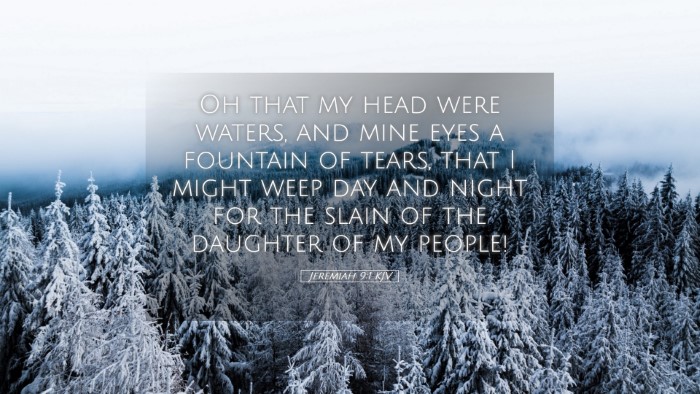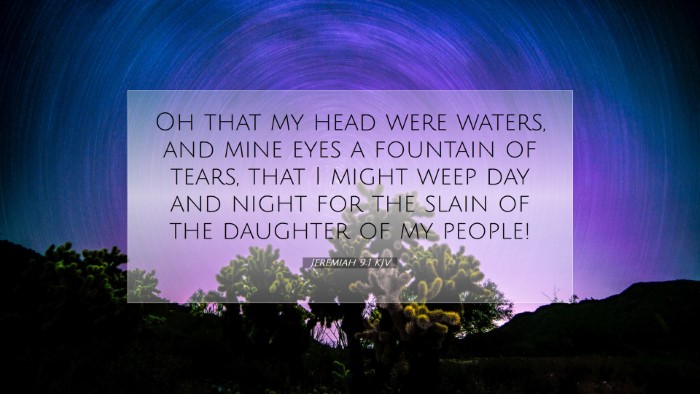Commentary on Jeremiah 9:1
Verse Text: "Oh, that my head were waters, and mine eyes a fountain of tears, that I might weep day and night for the slain of the daughter of my people!"
Introduction
The lamentation derived from Jeremiah 9:1 encapsulates the deep emotional turmoil experienced by the Prophet as he reflects on the tragic plight of his people. This verse reveals Jeremiah's profound grief over the impending calamities that would befall Judah due to their disobedience to God. This commentary synthesizes insights from various public domain sources to provide a comprehensive understanding suitable for pastors, students, theologians, and Bible scholars.
Contextual Background
Jeremiah, often called the "weeping prophet," was appointed at a time when Israel was facing moral decay and imminent judgment. The historical background of Jeremiah’s prophetic ministry is critical for interpreting his expressions of lamentation. In the context of the Babylonian siege, Jeremiah’s sorrow is a reflection not only of the nation's sin but also of God's grief over His people.
According to Matthew Henry, the Prophet's sorrow serves as an indictment against the sinful nature of the people, who have turned away from God's commandments. This turning reveals why Jeremiah's heart is burdened, as he looks upon the depths of their transgressions and the consequences that follow.
Emotional Expression
In this verse, the imagery employed by Jeremiah emphasizes the depth of his feelings. He wishes for his head to be filled with water and his eyes to be fountains of tears. Albert Barnes comments on the hyperbolic nature of this expression, highlighting that such language indicates an overwhelming desire to express his grief. The tears symbolize a deep sense of loss and empathy for those who suffer due to the consequences of sin.
Key Insights:
- Teardrops of Prophetic Sorrow: Jeremiah's yearning to weep continuously reflects a heightened sensitivity to sin and its implications, portraying him not merely as a messenger, but as one deeply affected by the state of his nation.
- Identification with Suffering: His desire to have his tears flow incessantly signifies a profound identification with the suffering of his people, inviting readers to consider the weight of communal sin and its effects.
Theological Implications
The verse opens opportunities for deeper theological reflection on divine justice and mercy. Adam Clarke explores how the expression of grief underscores God’s longing for His people to return to Him. It illustrates the tension between God's justice in punishing sin and His mercy, which desires repentance and restoration.
Considerations for Theological Study:
- The Nature of God’s Grief: The lamentations of Jeremiah echo the heart of God, revealing a divine sorrow for lost humanity, reinforcing the idea that God is not distant from human suffering.
- Call to Repentance: Through Jeremiah’s tears, we see a divine invitation to reconciliation, reminding the community of the importance of acknowledging sin and turning back to God.
- Relational Dynamics: The emotional plea also presents relational dynamics between God and His people, encouraging reflection on how sin creates rifts in relationship.
Application for Today
The lamentation in Jeremiah 9:1 serves as a profound reminder for today's believers regarding the seriousness of sin and its impact on personal and communal relationships. This scripture compels pastors and church leaders to approach discipleship with a heart of mourning for those who stray.
Furthermore, Matthew Henry encourages believers to channel their sorrow into intercession for the lost, emphasizing that such empathy fosters a deeper communal and eschatological responsibility. In imitating Jeremiah’s tears, we fulfill our role as agents of reconciliation and prayer warriors for the disheartened and lost.
Key Application Points:
- Evaluate personal responses to sin; cultivating a heart of compassion mirrors God's own heart.
- Encourage churches to create spaces for lament, fostering collective mourning and responsive action.
- Promote prayer ministries that focus on intercession for community well-being and spiritual awakening.
Conclusion
Jeremiah 9:1 encapsulates the pain of prophetic mission, revealing not only the heart of a man deeply concerned for his people but also the heart of God, who desires repentance and restoration. By engaging with this scripture, believers are invited into a deeper understanding of God's grief over sin and are challenged to respond with their own tears, prayers, and actions that reflect His heart toward a broken world.


